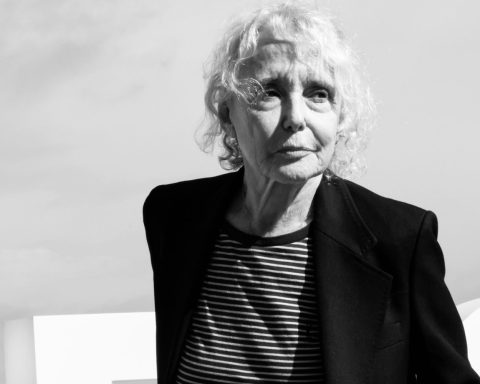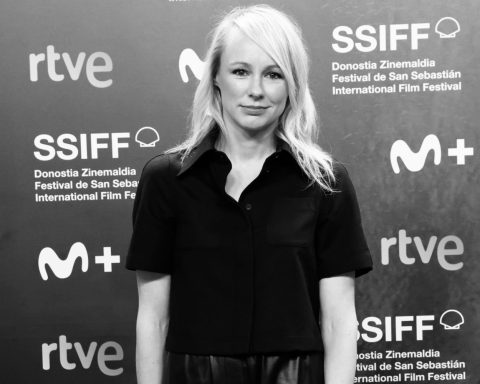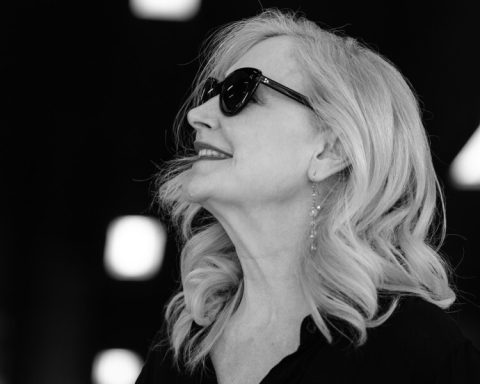Following her 2022 documentary El sostre groc, Catalan trailblazer Isabel Coixet returns to fiction with Un amor, vying for the Golden Shell at the 71st San Sebastian International Film Festival. The film, based on the eponymous best-seller by Sara Mesa, is an account of existential doubt and the transformative power of carnal desire, exploring the subversive nature of gender roles.
According to Coixet, Mesa is one of the most incredible voices in contemporary Spanish literature, “She’s very unique,” she shares. This is why Coixet immediately felt a connection with the book, “I thought ‘Okay, this book is a film and I’m seeing a film in my head,’” she says of the genesis of the project.
But Mesa was not involved in the adaptation of her book, “She was writing another novel and she said, ‘No, you’re here doing it,’” she tells Fade to Her.
Like in many of her previous works, Coixet also explores the themes of loneliness and trauma in Un amor, “It’s one of the things I like to talk about, because a bunch of people doesn’t talk about loneliness and pain, and also about the complexities of female desire, and I really wanted to do something about it. And this film was the perfect canvas to do that,” she explains. It is one more canvas that lent itself to Coixet’s subversive filmmaking that constantly challenges the male gaze and offers a raw and unadulterated female perspective that Cinema desperately needs, “I think it’s necessary to have female voices and female directors telling their side of the story how important it is to talk about the human experience as a whole, not just from the male point of view,” she claims.
In that sense, this is a natural endeavor for Coixet. Telling stories about complex, difficult and fun women is an intrinsic part of her existence both as a woman and as a director, “It’s my life. It’s the life of the people I like and the people I love and it’s not that I’m not interested in men; I am, of course, but we have female stories, so why not?” she says.
This is precisely what makes Coixet unyielding in her beliefs and true to herself and the values she stands for as a woman, “It’s a constant in our lives as women also – all the time. You’re going to travel, so it’s ‘Are you traveling alone?’ You go to a restaurant and it’s, “Are you eating alone?’. You spend a night in an isolated house and it’s ‘Were you not scared?’ Do I have to be scared? Why? Why are you asking me that? Is there something I really need to be scared of? So, it’s constant macho things…” she criticizes.
Much like her characters, Coixet is an outsider, “I always think that this film is a cross between The Bookshop and The Secret Life of Words,” she comments.
When she speaks of Nat, her protagonist in Un amor, Coixet it is almost apologetically and compassionately, explaining that she wants to be accepted, “She wants to please and what makes the conflict of this movie is the vulnerability. That thing about pleasing or wanting to please makes you vulnerable. So, they can attack you easily. When you don’t care about the rest of the people, you’re protected because you really don’t care,” she declares.
This is where the dichotomy the urban outsiders and the countryside locals comes into play. Coixet explains that when one goes to a new place, they are automatically subjected to the local human surveillance apparatus, “They are eager to accept you, but also you have to play their game. You have to be like they want you to be,” she posits. These micro-aggressions are where Coixet’s interests really lie, “When someone wants to help you and then you say you don’t need it, and then they are kind of forcing you to accept this help,” she argues.
For Un amor, Coixet did not adhere to the current Hollywood trendy practice of hiring an intimacy coordinator on set even though she did offer it to her actors, “In my case, if someone needs whatever tools to achieve what you want them to achieve, fine by me if you don’t need to cross any line about values, but at the same time, I think this is the duty of a director,” she affirms. She believes she can have an adult conversation with her actors and establish an atmosphere of trust, “If someone has a problem, please, I’m the first one who has to know and I try to be always very present with my actors. When you’re doing these things, it’s your duty to say what you want, how you’re going to do it, what you mean, why this is very important in the film, if it is, and then be very specific. You cannot throw your actors like that in bed and say, ‘Okay, you know, you’re f*cking!’ No! That’s not something that I think is ethical, pragmatic and professional,” she contends.
Understanding is indeed the cornerstone of Coixet’s filmmaking practice, but also an important part of her onscreen thematic exploration, especially in terms of relationships, “I understand very well. I have to say, I have lived in a men’s world all my life and I really understand their way of behaving, their way of living, but also, I am who I am and I have the experiences that I have because I’m a woman. And I love to put that down into my films,” she maintains.
Asked whether she sees any changes in the situation of women in film today, she thinks there are many advantages that come attached with the condition of being a woman, but the film industry is trying, according to her, to overplay the shift as more significant than it actually is, “Now, we’re talking about empowering. Personally, I don’t like the word. But whenever I think that you have power, or that you don’t have power, power is money. The moment you will give me or the women of the world exactly the same budgets and pay the women exactly the same, maybe a little more, then why not?” Coixet weighs in.
But she expresses her concern, adding, “I see that it is really a concern… I don’t see the budgets of the new generation filmmakers are better. And I don’t see my budgets being better except, of course, for franchises like let’s say Barbie and Wonder Woman. I am very happy these films are making money and having women directors, but this is not a film in the traditional sense. Those are franchises. One is using a very, very clever film to sell dolls, and the other one sells a franchise,” she concludes critically.
Photo credits: © Festival de San Sebastián. Photo: Ulises Gutiérrez.
This interview was conducted at the 2023 San Sebastian International Film Festival.









